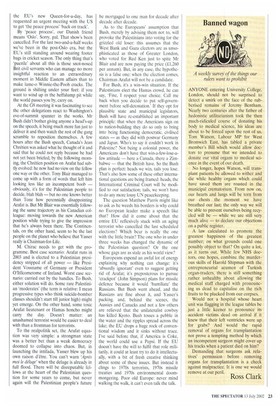Banned wagon
A weekly survey of the things our rulers want to prohibit ANYONE entering University College, London, should not be surprised to detect a smirk on the face of the rubberised remains of Jeremy Bentham. Nearly two centuries after the father of hedonistic utilitarianism took the then much-ridiculed course of donating his body to medical science, his ideas are about to be forced upon the rest of us. Tom Watson, Labour MP for West Bromwich East, has tabled a private member's Bill which would allow doctors to presume that we intended to donate our vital organs to medical science in the event of our death.
No longer, hopes Watson, will transplant patients be allowed to wither and die while healthy organs which could have saved them are roasted in the municipal crematorium. From now on, our hearts and lungs will be torn from our chests the moment we have breathed our last; the only way we will be able to prevent ourselves being recycled will be — while we are still very much alive — to declare our objections on a public register.
A law calculated to promote the greatest happiness of the greatest number; on what grounds could one possibly object to that? On quite a lot, as it turns out. While few NHS doctors, one hopes, combine the murderous skills of Harold Shipman with the entrepreneurial acumen of Turkish organ-traders, there is still something rather unhealthy about allowing the medical staff charged with pronouncing us dead to capitalise on the rich fruits to be plucked from our corpses.
Would not a hospital whose heart unit was flagging in the league tables be just a little keener to pronounce its accident victims dead on arrival if it knew that their left ventricles were up for grabs? And would the rapid removal of organs for transplantation not prove a tempting method by which an incompetent surgeon might cover up his tracks when a patient died on him?
Demanding that surgeons ask relatives' permission before removing organs for transplantation is a check against malpractice. It is one we would remove at our peril.
Ross Clark


































































 Previous page
Previous page